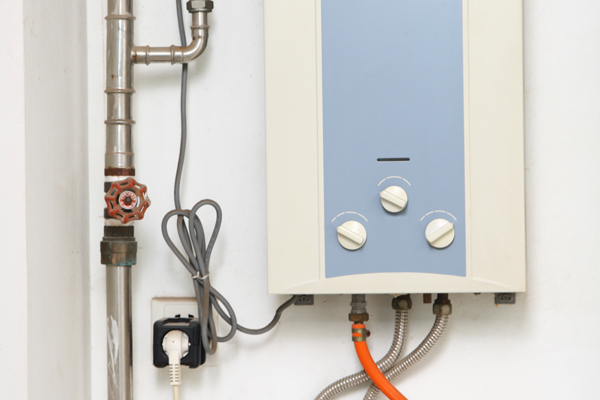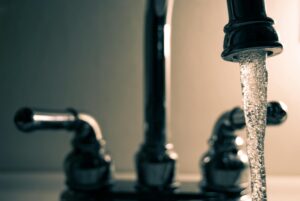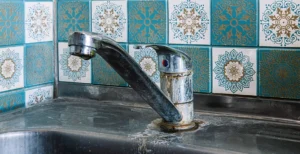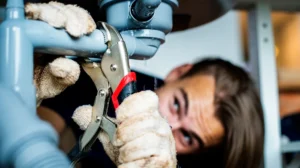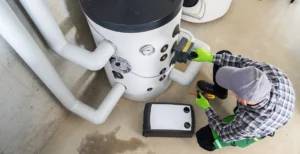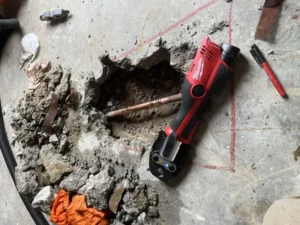If you’re troubleshooting water heater problems and own a tankless unit, this article is for you. It offers advice on how to tell if a water heater is going bad and what you can do to address the most common problems. If your tankless water heater is not working properly, this troubleshooting guide can help.
Common Water Heater Problems and How to Fix Them
The following addresses standard tankless water heater troubleshooting methods to help you resolve your issues.
Water Temperature Problems
When it comes to water heater problems, issues with temperature top the list. Whether your tankless heater is running too cold, too hot, or never gets quite hot enough, the following will help you identify and fix the issue.
The Water is Too Cold
If your water heater is not heating, you probably are experiencing one of three issues:
- The water heater lacks power
- Your heating element is faulty
- You have a water heater thermostat problem
To troubleshoot your cold water issue, check the circuit breaker to see if it’s been tripped or if blown fuses need to be replaced. After resetting the breaker, ensure all applicable power switches are turned to the on position and that power indicators are lit.
For tankless water heater troubleshooting on a gas water heater, you’ll want to check to see if the ignition has gone out. That could happen if the gas supply is low or the valves for the gas or water are closed — both of which can keep the flame from igniting. If that’s the case, simply ensure you have a sufficient gas supply, and the valves are open so the gas can ignite the flame.
Next, make sure the thermostat is connected to and receiving power. The water heater should resume functioning normally if all power connections are correctly restored. If your water still isn’t heating, you likely have a faulty heating element that will need to be replaced.
The Water Gets Warm But Not Hot
Things to look for when the water doesn’t heat up enough include:
- Your water heater doesn’t have the suitable capacity
- Your hot and cold connections are crossed
- Your heating element is damaged
- Your thermostat is damaged
Look at your owner’s manual to determine whether your home has an undersized water heater. If this is the case, you will likely need to consider a larger replacement. To determine if your hot and cold connections are crossed, turn off the water supply at the source and turn on a hot water faucet. If you see water still flowing, there’s a good chance you’ve got a crossed connection.
If you need to engage in diagnostics of your water heater’s heating elements, suspect the thermostat may be shot, or have determined that your heater is, in fact, too small for your home, your best bet is to contact a licensed professional.
The Water Gets Too Hot
More often than not, the cause of water running too hot is a thermostat issue. Perhaps the thermostat is set too high. Consult your owner’s manual to see if you can reset it to the recommended temperature of 120℉. If not, you’ll need to call for professional help.
Water Heater Leaks
Tankless water heaters leak for three reasons: hard water, high water pressure, and improper installation.
Leaks From Hard Water
Hard water is found all over the US. An abundance of minerals like calcium and magnesium causes this issue. If your area has hard water, it will leave a white scale in your pipes, blocking the water flow and eventually eating through the lines. Leaving these scales in your tankless water heater for too long can cause it to leak. The damage may be so severe that you must replace your tank.
If you know you have hard water, you should flush out your tankless water heater at least once a year. If you use your water heater a lot — if you have a large family, for example — you may want to flush it out twice a year. You should also protect your water heater with a water filtration system.
Leaks From High Water Pressure
High water pressure can also damage your water heater and cause a leak. You’ll probably need to replace the unit if this damage has already occurred. You can also install a pressure relief valve to protect your tankless water heater. That regulator attaches to your mainline to maintain a safe water pressure level.
Leaks From Improper Installation
Tankless water heaters must be installed following the unit’s specifications. For example, if your unit is installed with just one untightened fitting, it could leak. Similarly, improper venting will result in a build-up of condensation that can appear to be a leak.
If you’re experiencing leaks from a subpar installation, you’ll need a professional to come out and reinstall the unit.
Loud Noises
Another common problem with tankless water heaters is noise. Not all noises emanating from a tankless water heater are ominous. Most heaters make some kind of noise when starting to heat water. For instance, if you hear a noise when the hot water is not being used, it’s probably from a vacuum siphoning water away from the unit.
Other noises could be caused by plumbing fixtures interfering with water flow to the heater or, for gas heaters, a dirty gas flow sensor. Some noises might result from inadequate ventilation or a defective or improperly set pressure valve.
You might hear the following noises from or near your water heater. Some cause concern, while others are considered normal or require a simple adjustment. If you’re unsure what the noise is or where it’s coming from, consulting with a licensed professional is the best way to ensure you maintain your water heater properly.
- A humming sound indicates that your water heater element is loose. While it can be annoying, it doesn’t mean your water heater is broken. You can fix the problem by simply tightening the element.
- A hammering sound is usually a result of pipes slamming against the wall whenever the water pressure builds up. Not a water heater problem per se, a plumber can install a water hammer arrestor that should take care of the noise.
- A hissing noise usually indicates the presence of a leak, often due to an old heater that needs to be replaced.
- A screeching noise is that high-pitched sound that occurs when a valve doesn’t open all the way. The valve at the water heater may need to be replaced.
- A ticking or tapping sound often occurs in the room where the water heater is located. That is coming from the installed heat traps or check valves to ensure that water flows in the proper direction. It’s nothing to be concerned about.
Brown or Foul-Smelling Water
Strange smells or discolored water are indications that you have a build-up of minerals — usually magnesium and calcium — in your system. That is one instance where an ounce of prevention is worth a pound of cure. If you can flush out your heater at least twice a year, you may be able to avoid this problem. If you’re already experiencing mineral buildup, you’ll need to flush it using a commercial descaling solution or a homemade vinegar flush.
Another reason for rusty water is the corrosion of your tank’s inner lining, which could be caused by a failing anode rod. This situation will require you to contact a professional to determine if it can be replaced. If not, you’ll need to replace your unit.
Tankless Water Heater Troubleshooting With Cowboy Plumbing Services
If you suspect your electric water heater is not working correctly or need help troubleshooting your gas water heater, Cowboy Plumbing Services can help.
Family owned and operated for over 20 years, Cowboy Plumbing Services can answer all your water heater questions. Contact us today if you need plumbing service in New Braunfels, Canyon Lake, San Marcos, Spring Branch, Bulverde, North San Antonio, or the surrounding Texas Hill Country. Our customers mean the world to us, and we are here to ensure you have a solid plumbing system you can depend on.

